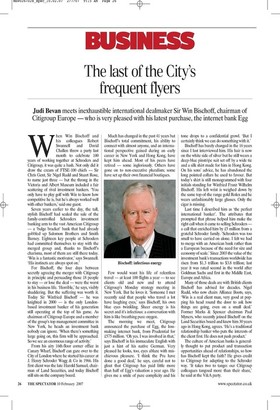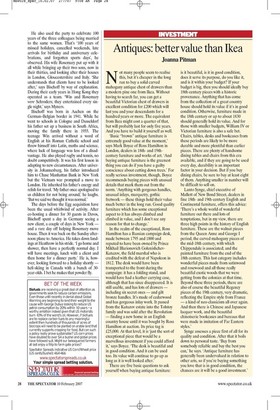The last of the City's frequent flyers
Judi Bevan meets inexhaustible international dealmaker Sir Win Bischoff, chairman of Citigroup Europe — who is very pleased with his latest purchase, the internet bank Egg Iv hen Win Bischoff and his colleagues Robert Swannell and David Challen threw a party last month to celebrate 100 years of working together at Schroders and Citigroup, it was quite a bash. Not only did it draw the cream of FTSE-100 chiefs — Sir Chris Gent, Sir Nigel Rudd and Stuart Rose, to name just three — but the throng in the Victoria and Albert Museum included a fair scattering of rival investment bankers. 'You only have to play golf with Win to know how competitive he is, but he's always worked well with other bankers,' said one guest.
Seven years earlier to the day, the tall, stylish Bischoff had sealed the sale of the family-controlled Schroders investment banking arm to the vast American Citigroup — a 'bulge bracket' bank that had already gobbled up Salomon Brothers and Smith Barney. Eighteen key people at Schroders had committed themselves to stay with the merged group and, thanks to Bischoff s charisma, most of them are still there today. Win is a fantastic motivator,' says Swannell. 'His instincts are always spot on.'
For Bischoff, the four days between secretly agreeing the merger with Citigroup in principle and persuading those 18 people to stay — or lose the deal — were the worst in his business life. 'Horrible,' he says, visibly shuddering. But the suffering was worth it. Today Sir Winfi-ied Bischoff — he was knighted in 2000 — is the only Londonbased investment banker of his generation still operating at the top of his game. As chairman of Citigroup Europe and a member of the group's top management committee in New York, he heads an investment bank nobody can ignore. 'When there's something large going on, this firm will be approached. So we see an enormous range of activity.'
From his airy 16th-floor corner office in Canary Wharf, Bischoff can gaze over to the City of London where he started his career at J. Henry Schroder Wagg & Co in 1966. His first client was the late Harold Samuel, chairman of Land Securities, and today Bischoff still sits on the company board.
Much has changed in the past 41 years but Bischoff's total commitment, his ability to connect with almost anyone, and an international perspective gained during an early career in New York and Hong Kong, have kept him ahead. Most of his peers have retired — some ingloriously. Others have gone on to non-executive pluralism; some have set up their own financial boutiques.
Few would want his life of relentless travel — at least 100 flights a year — to see clients old and new and to attend Citigroup's Monday strategy meeting in New York. But he loves it. 'Someone I met recently said that people who travel a lot have laughing eyes,' says Bischoff, his own blue eyes twinkling. Sheer energy is his secret and it's infectious: a conversation with him is like breathing pure oxygen.
The morning we meet, Citigroup announced the purchase of Egg, the lossmaking internet bank, from Prudential for £575 million 'Oh yes. I was involved in that,' says Bischoff in his immaculate English with just a hint of his native German. Very pleased he looks, too, eyes ablaze with mischievous pleasure. 'I think the Pru have done a good deal,' he says, careful not to gloat that Citigroup has paid little more than half of Egg's valuation a year ago. He gives me a smile of pure complicity and his tone drops to a confidential growl. 'But I certainly think we can do something with it.'
Bischoff has barely changed in the 16 years since I last interviewed him His hair is now on the white side of silver but he still wears a deep-blue pinstripe suit set off by a wide tie and a silk shirt made for him in Hong Kong. On his sons' advice, he has abandoned the long pointed collars he used to favour. But today's shirt is still monogrammed with four initials standing for Winfi-ied Franz Wilhelm Bischoff. His left wrist is weighed down by the same top-of-the range gold Rolex and he wears unfashionably large glasses. Only the cigar is missing.
Last time I described him as `the perfect international banker'. The attributes that prompted that phrase helped him make the right call when it came to selling Schroders — a call that enriched him by £5 million from a grateful Schroder family. `Schroders was too small to have carried on alone. I felt we had to merge with an American bank rather than a European because of the need for size and economy of scale.' Since 2003 the value of the investment bank's transactions worldwide has risen from $1.3 trillion to $3.8 trillion; last year it was rated second in the world after Goldman Sachs and first in the Middle East, Europe and Africa.
Many of those deals are with British clients Bischoff has advised for decades. Nigel Rudd, who now chairs Alliance Boots, says, 'Win is a real client man, very good at popping his head round the door to ask how things are going, even on a small deal.' Former Marks & Spencer chairman Paul Myners, who recently joined Bischoff on the Land Securities board and knew him 30 years ago in Hong Kong, agrees. 'He's a traditional relationship banker who puts the interests of the client first. He does not push product.'
The culture of American banks is generally thought to put product and transaction opportunities ahead of relationships, so how has Bischoff kept the faith? He gives credit to Citigroup for adapting to the Schroder way. 'It takes two to tango: our Citigroup colleagues tangoed more than their share,' he said at the V&A party.
He also used the party to celebrate 100 years of the three colleagues being married to the same women. That's '100 years of missed holidays, cancelled weekends, late arrivals for birthday and anniversary celebrations, and forgotten sports days', he observed. His wife Rosemary put up with it all while bringing up their two sons, now in their thirties, and looking after their houses in London, Gloucestershire and Italy. 'She understands that clients have to be looked after,' says Bischoff by way of explanation. During their early years in Hong Kong they operated as a team. Win and Rosemary were Schroders; they entertained every single night,' says Myners.
Bischoff was born in Aachen on the German–Belgian border in 1941. While he went to schools in Cologne and Dusseldorf his father set up a business in South Africa, moving the family there in 1955. The teenage Win arrived without a word of English at his Roman Catholic school and threw himself into Latin, maths and science, where lack of language was less of a disadvantage. He also played rugby and tennis, no doubt competitively. It was his first lesson in adapting to new circumstances. After university in Johannesburg, his father introduced him to Chase Manhattan Bank in New York but the Vietnam war prompted a move to London. He inherited his father's energy and relish for travel. 'My father once apologised to us children for not being around,' he laughs. 'But we said we thought it was normal.'
The days before the Egg acquisition have been the usual whirlwind of activity. After co-hosting a dinner for 30 guests in Davos, Bischoff spent a day in Germany seeing a new client, a couple of days in New York — and a rare day off helping Rosemary move house. Then it was back on the Sunday afternoon plane to America. He takes dawn landings at Heathrow in his stride. 'I go home and shower, then have a perfectly normal day. I will have meetings, lunch with a client and then home for a dinner party.' He is, however, looking forward to a holiday shortly — hell-skiing in Canada with a bunch of 30year-olds. I bet he makes that powder fly.














































 Previous page
Previous page